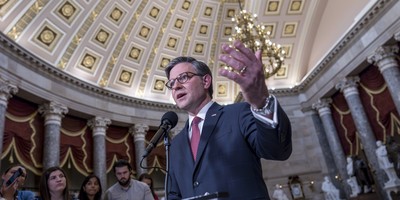The problem, from McConnell's perspective, is that so many of his fellow Republicans insisted they would not vote to raise the debt limit, currently $14.3 trillion (nearly the size of the entire economy), without corresponding spending cuts. With Obama demanding tax hikes, which Republicans have sworn to oppose, they realized they were losing a game of chicken in which onrushing headlights were replaced by a fast-approaching deadline of Aug. 2, when federal borrowing is expected to hit the limit.
McConnell's supposedly face-saving method of chickening out is to disguise one swerve with another: Instead of approving additional borrowing, Congress passes a bill that authorizes the president to initiate a series of three increases in the debt limit. Congress can still vote against each round of new borrowing, but Obama can veto those resolutions of disapproval, meaning a two-thirds majority of each house is required to make them stick. In effect, Plan B allows a minority to approve an increase in the debt limit that would otherwise require a majority.
The idea is that Republicans, who hold 240 out of 435 seats in the House and 47 out of 100 seats in the Senate, can avoid not only the blame for risking default but also the blame for raising the debt limit without commensurate spending cuts. Pretty clever, huh?
A little too clever. McConnell's scheme seems like a complicated way of fooling no one, since Republicans still would have to vote for the overall plan, a vote that would even include an initial, just-in-case authorization for $100 billion in new borrowing. Disclaiming responsibility for setting this process into motion would be like turning the crank in Mouse Trap, then feigning surprise when a cage drops on the little plastic rodent.
Recommended
McConnell and his Democratic co-conspirator, Senate Majority Leader Harry Reid, have baited the trap with promises of yet another fiscal commission. Didn't we just have one of those, with 18 members appointed jointly by Congress and the president? After much sober discussion and serious debate, it delivered its report last December, directly into the national memory hole.
This new commission will be totally different. According to The Hill, it will be "a special bipartisan committee" with only six members, all of them drawn from Congress. If four of them can agree on a package of spending cuts, Congress will have to vote it up or down, without amendment. This time for sure!
You may be thinking: Doesn't Congress already have "special bipartisan committees" that deal with spending? You may also be thinking: If a majority of Congress can agree on a package of spending cuts, why hasn't it already done that?
A balanced budget amendment, favored by many fiscal conservatives, likewise reeks of failure. If Congress can't muster a simple majority to balance the budget, how likely is it to muster a supermajority that (assuming at least 38 state legislatures eventually agree) forces it to balance the budget? The amendment sounds to me like a desperate whine: "Stop us before we spend again!"
Is it any wonder that the public has such a low opinion of Congress? According to a recent CBS News poll, only 31 percent of Americans approve of the way Democrats have handled the budget negotiations, while the approval rating for Republicans is just 21 percent. By continuing to abdicate their legislative responsibilities, both parties seem determined to see how low they can go.

























Join the conversation as a VIP Member